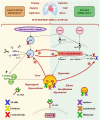Novel Pharmacotherapies for Recurrent Pericarditis: Current Options in 2020
- PMID: 32562029
- PMCID: PMC7303578
- DOI: 10.1007/s11886-020-01308-y
Novel Pharmacotherapies for Recurrent Pericarditis: Current Options in 2020
Abstract
Recent advances have shown impressive results by anti-interleukin 1 (IL-1) agents in refractory idiopathic recurrent pericarditis. PURPOSE OF REVIEW: We critically discuss the current state of the art of therapy of relapsing pericarditis, with a focus on new pharmacological approaches and on specific clinical settings such as pregnancy, pediatric patients, and secondary forms of relapsing pericarditis. RECENT FINDINGS: Antagonism of the IL-1 is highly effective in idiopathic recurrent pericarditis with autoinflammatory features. Currently, available anti-IL-1 agents are anakinra and canakinumab. Rilonacept is another IL-1 antagonist, currently studied in the phase-3 clinical trial RHAPSODY. Available data suggest similar efficacy and safety profiles of these three agents, although only anakinra has been tested in randomized clinical trials. These agents have slightly different pharmacological properties, being canakinumab a specific IL-1ß antagonist while anakinra and rilonacept are unselective IL-1α and IL-1ß blockers. To date, there is no evidence that specificity against IL-1ß affects safety and efficacy in patients with relapsing pericarditis, although it has been proposed that unspecific blockage might be useful in severe disease. Anakinra is the first anti-IL-1 agent with well-documented efficacy and safety in adult and pediatric patients with idiopathic relapsing pericarditis. Other anti-IL-1 agents are currently under study. Future research should clarify the optimal duration of therapy and tapering schedule of treatment with these agents. Moreover, biomarkers would be required to understand which patients will benefit from early administration of IL-1 blockers due to refractoriness to conventional therapy and which others will suffer from recurrences during the tapering of these agents. Lastly, future studies should focus on the subjects with the autoimmune or the pauci-inflammatory phenotype of idiopathic refractory pericarditis.
Keywords: Anakinra; Anti-IL-1 drugs; Inflammatory refractory pericarditis; Recurrent pericarditis.
Conflict of interest statement
Prof Brucato discloses unrestricted research grants by SOBI and SOBI e ACARPIA. All other authors have no conflict of interest to disclose.
Figures

References
-
- •• Adler Y, Charron P, Imazio M, Badano L, Barón-Esquivias G, Bogaert J, et al. 2015 ESC guidelines for the diagnosis and management of pericardial diseases. Eur Heart J. 2015;36(42):2921–64. 10.1093/eurheartj/ehv318. 2015 ESC Guidelines summarize and evaluate all available evidence on pericardial diseases, with the aim of assisting health professionals in selecting the best management strategies for the diagnosis and management of these clinical conditions.
-
- •• Lu YY, Chen YJ. A randomized trial of colchicine for acute pericarditis. N Engl J Med. 2014;370(8):780. 10.1056/NEJMc1315351. Th Authors discussed findings from a randomized trial of colchicine for acute pericarditis. - PubMed
-
- • Brucato A, Imazio M, Cremer PC, Adler Y, Maisch B, Lazaros G, et al. Recurrent pericarditis: still idiopathic? The pros and cons of a well-honoured term. Intern Emerg Med. 2018;13(6):839–44. 10.1007/s11739-018-1907-x. The Authors discussed the pros and cons of using the term "idiopathic" in light of the new knowledge. - PubMed
Publication types
MeSH terms
Substances
LinkOut - more resources
Full Text Sources
Medical
Research Materials

